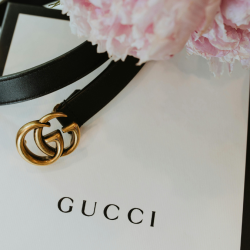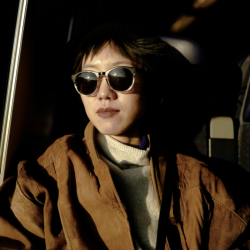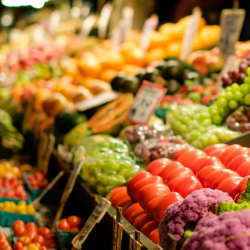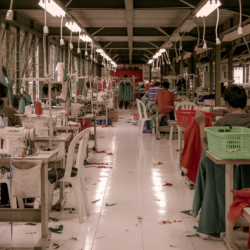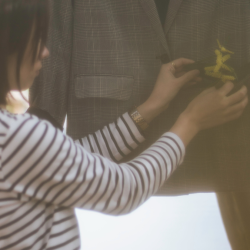Food and fashion have always been about indulgence…
Across civilisations, our ancestors used sumptuous banquets and sartorial designs to showcase social status, spectacle and cultural identity.
In recent years, this fusion has taken on a new resonance. Oddly, in an industry long-preoccupied with thinness, food-inspired collections have dominated catwalks over the last decade. In 2014, Karl Lagerfeld transformed Paris’ Grand Palais into a Chanel-themed supermarket. During his ten-year tenure at Moschino, Jeremy Scott often turned to fast food for inspiration, telling British Vogue: ‘You name a type of food and I’ve created a look around it!’
Off the runway, we see food and fashion gravitating towards each other in a growing number of curious and unlikely brand partnerships. Are these collaborations merely playful marketing stunts — cost-efficient paths to secure virality and cultural cachet — or do they reflect a deeper shift in how we consume?
#Foodcore, and the era of the curated life
What we eat and drink have transcended mere sustenance into coveted status symbols — objects to be styled, photographed, and consumed. TikTok’s ‘foodcore’ is at the core of this cultural shift, where models often moonlight as culinary tastemakers. Cooking elaborate meals from scratch in pre-fall Chanel, Nara Smith has amassed 9M followers for her highly-stylised, aspirational content. Gabbriette (of Brat It-Girl infamy, IYKYK) first captivated audiences with her home cooking videos and hit 3.5M views with a recreation of Erewhon’s vegan blackout cake. Erewhon itself has morphed into a cultural signifier; the ‘unofficial hangout for the young, beautiful and bored‘ where a $20 smoothie order embodies ‘consumer luxury and unattainable wellness.’
Increasingly, food isn’t just about what’s on the plate; it’s a statement of identity. Cassandra’s Young and Hungry report reveals that more than half of Gen Z believe what they eat reflects who they are. Veganism in the UK doubled by 1.1 million last year to become the world’s new vegan capital. Conscious eating is on the rise, with more people favouring healthier, sustainable, and ethical options.
Conscious everything is on the menu à la social media: Pinterest organises culinary trends and aspirations into aesthetically-pleasing boards, and TikTok has fast become the go-to platform for restaurant recommendations and recipes. As creators shape personal brands around niche food content, the dining experience is an increasingly visual performance, with every bite curated for an ever-watching digital audience.
Ingredients for collaborative success
Whilst the intersection of food and fashion isn’t new, 2024 has brought a fresh wave of collaborations that offer insight into some intriguing emerging trends. Crocs’ unlikely ascent from fashion pariah to Gen Z staple sparked from unlikely collaborations; starting on Christopher Kane’s 2017 runway, soon followed by Balenciaga’s viral platforms. Since then, the brand has mastered both the mass market and high-fashion scene, tapping up a slew of high-profile brands, designers, celebrities and F&B giants, including Simone Rocha, Justin Bieber, KFC, Hello Kitty and many more. Their latest venture with McDonald’s will soon bring limited-edition keychains to Happy Meals across 40 global markets.
Why it works:
- Crocs’ silhouette offers collaborators the creative scope to reimagine the iconic clog whilst maintaining its recognisability
- Jibbitz — low-cost, high-margin charms — allow endless customisation, provide unique personalisation and turn a substantial profit
- Collaborations with luxury brands create accessible, collectible pieces, offering consumers a way into high-end fashion they might not otherwise afford
- Nostalgia and pop-culture-fuelled designs tap into Gen Z’s embrace of playful, ‘meme-able’ aesthetics.
From Barilla pasta to Absolut martinis, designer Nik Bentel is carving out a niche in absurdist food designs. His latest partnership with Lidl elevates their best-selling bakery item to create the ‘Croissant Handbag’. The item’s initial drop sold out in two minutes and appeared at London Fashion Week pop-up, Lidl Patisserie, where queues formed around the block. Their latest venture sees the £50 cult bag available for just £5 a day on fashion rental app By Rotation, with all proceeds going to the NSPCC.
Similarly, Greggs recently teamed up with designer and activist Dion Kitson to launch their first official jewellery line; a kitsch collection that celebrates the bakery’s beloved pastries. The limited-edition range includes 22-carat Jammy Dodger necklaces, and sausage roll earrings for meat-lovers and vegans alike. Following a successful 2022 collaboration with Primark that sold out in days, this new partnership further cements Greggs’ status beyond the scope of food retail.
Why it works:
- Lidl and Greggs boast established brand resilience and loyalty, courtesy of their daily role in consumers’ lives
- Food merch, now the lingua franca of ironic consumerism, speaks directly to Gen Z, and was spotted frequently at Glastonbury this summer
- Charitable donations and activist collaborations lend these partnerships gravitas and social impact
- By transforming mundane objects into limited-edition collectibles, they prove that scarcity sells
Back on the runway, Chopova Lowena hit headlines at London Fashion Week when they debuted their Margaret bag. Named after Hellmann’s founder, Margaret Hellmann, each bag features a jar of the brand’s mayonnaise with a dedicated holder and Victorian silver spoon. ‘The ambition of the partnership is to build audience connections with Hellmann’s beyond the fridge by cementing it into high-impact cultural moments,’ Hellmann’s told Dezeen. Limited quantities will be available at Dover Street Market London later this year.
Why it works:
- Merging luxe materials with everyday items, Chopova is already known for blending folklore and high fashion into cult, tongue-in-cheek pieces.
- Hellmann’s leans into Chopova Lowena’s edge to position itself beyond the fridge, embedding the brand into fashion’s cultural zeitgeist
- The launch of this bag coincides with trending social moments, as searches for ‘dinner party’ increased by 6000% this summer
- The blend of vintage details with modern irony ties heritage brand history to today’s fashion landscape.
A new era of taste?
The worlds of cuisine and couture are both inextricably linked to our physical (and increasingly, digital) selves. Concepts of taste permeate both spheres, offering rich visual language for social expression, construct and connection.
Whilst these collaborations have been criticised for leaning into marketing gimmickry, their success in speaking directly to consumers can’t be denied. In a retail landscape obsessed with the ephemeral — limited-edition drops, nostalgia-fuelled revivals and an enduring love of novelty — co-branded products are almost guaranteed virality. They generate organic buzz, providing new resonance and reach, and create an enduring impact beyond their individual customer bases.
Whether this marks a synergised future for both categories or simply a passing trend remains to be seen. Perhaps the phenomenon signals a positive change in how we view fashion, food and body image. In the scope of our curated lives, collaborations invite us to embrace a more holistic understanding of our identities; encouraging playfulness, creativity and more daring self-expression, both as brands and consumers.
Featured image: Lidl x Nicholas Bentel



























